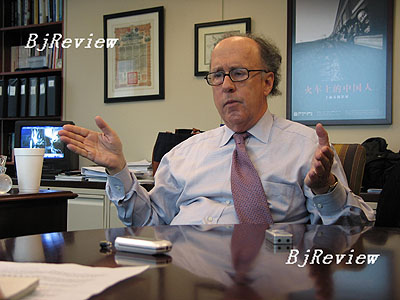
Washington’s recent actions against China over trade disputes and Beijing’s strong reactions to those measures have heightened fears that mounting friction over bilateral trade will intensify. It is now “urgent” to get the China-U.S. trade relationship correct, said Stephen Roach, newly appointed Chairman of Morgan Stanley Asia. Roach, who for the past 16 years served as Morgan Stanley’s chief economist, predicts a more broad-based consumer led growth in China in the next five years. He is also convinced that serious initiatives to be undertaken by the U.S. Government to penalize Chinese products as they are sold in the United States will be a big mistake. Beijing Review spoke to him about these and other aspects of Sino-U.S. trade and China’s new economic growth model.
Beijing Review: The second China-U.S. strategic economic dialogue is to be held this month in Washington D.C. Are these types of economic talks usually productive?
Stephen Roach: I think it’s always healthy for the leadership of two important countries to get together. The concept of the strategic economic dialogue is good, but the result has been disappointing, at least at the first meeting.
I’m not optimistic we will see a major breakthrough [in the upcoming strategic economic dialogue]. I think there will be a lot of well-orchestrated events, but I don’t think that we are going to see major breakthroughs in any of the more contentious issues of U.S.-China trade policy.
There is a new urgency to getting the U.S.-China trade relationship correct, in large part because the U.S. Congress is moving ahead to impose trade sanctions on China. What worries me is that you have the strategic economic dialogue occurring between the Chinese leadership and the Bush administration, but the real drivers of the story from the U.S. point of view are not included, that’s the U.S. Congress. The U.S. Congress is impatient and is increasingly determined to take action.
U.S. foreign policy is sometimes thought of as strongly tied to, or even hostage of, its domestic policy. Take for example the recent trade actions against China taken by the Bush administration. What is your view on these actions?
I think the administration did it in large part to convince the U.S. Congress that it was getting tough on China and hopes to persuade the Congress that they did not have to act because the administration was talking tough. But in talking with senators and congressmen, these actions are viewed as not even nearly tough enough to prevent them from taking further action on their own. So as I said earlier, it’s the Congress that’s driving the U.S. side of this deal. The White House or the Commerce Department and the USTR (Office of the U.S. Trade Representative) are opening up the WTO dispute on two counts of IPR (intellectual property rights). Those are reactions to the Congress rather than independent developments.
The U.S. administration is reacting because of the shift in the U.S. Congress to adopt anti-China trade legislation. The administration, in my opinion, would not have taken these actions were it not for the concern expressed by the U.S. Congress.
What is your opinion on the possible legislation to be adopted by the U.S. Congress? Will this intensify trade tensions between the two countries?
Yes, absolutely. These will be much more serious initiatives undertaken by the U.S. Government to penalize Chinese products as they are sold in the United States. I think it’s a mistake. I’ve testified two times in front of the U.S. Congress in the last two months to argue that the United States should not hold China accountable for trade deficits that are in large part an outgrowth of America’s structural shortfall of domestic saving. But the Congress is being motivated by a deep sense of concern and insecurity of American middle-class workers and they are convinced that the big trade deficit is the problem. The 34 percent of our multilateral trade deficits with China is the primary source of our trade deficit. The Congress feels it’s appropriate to impose sanctions on China.
| 